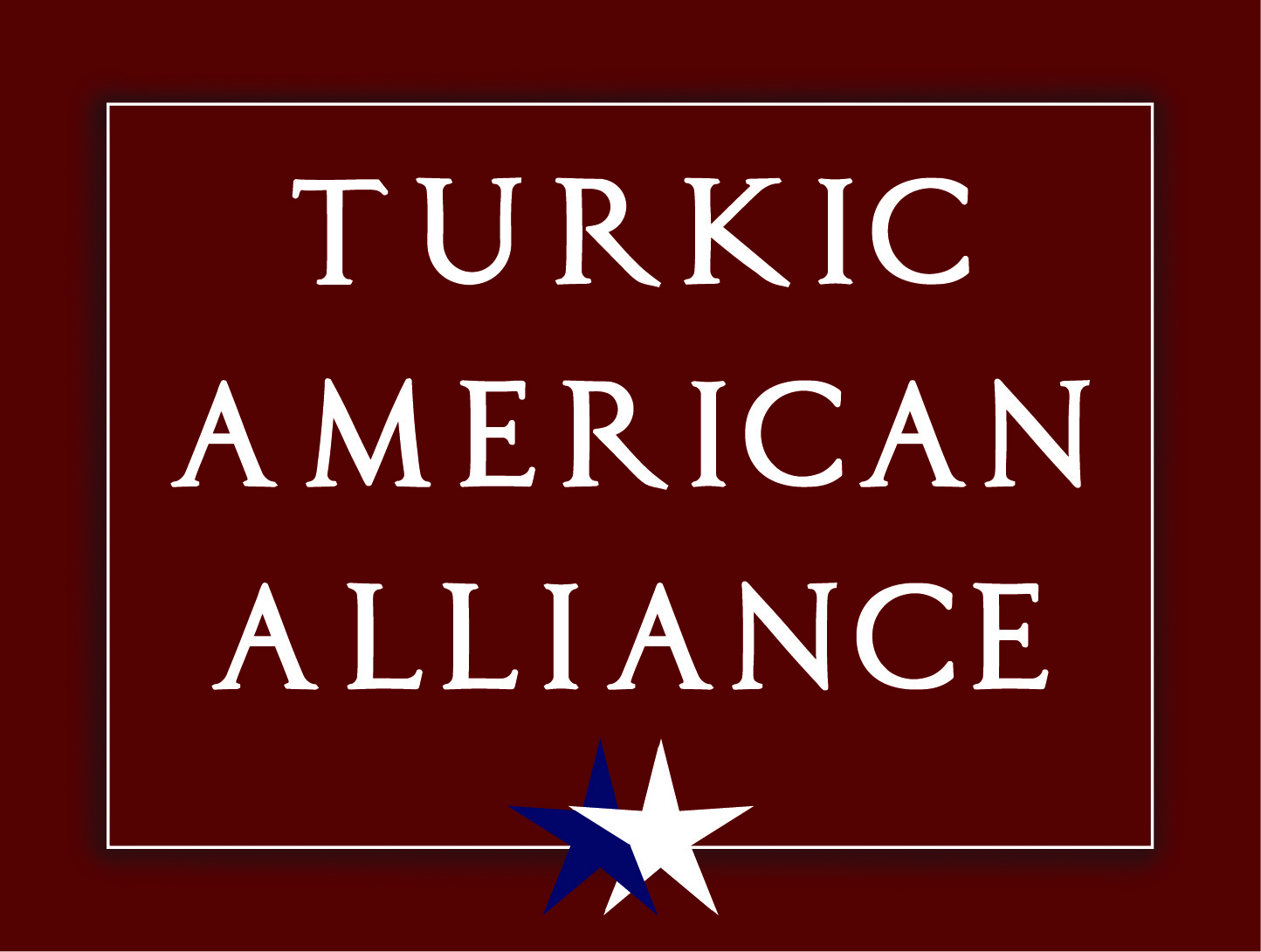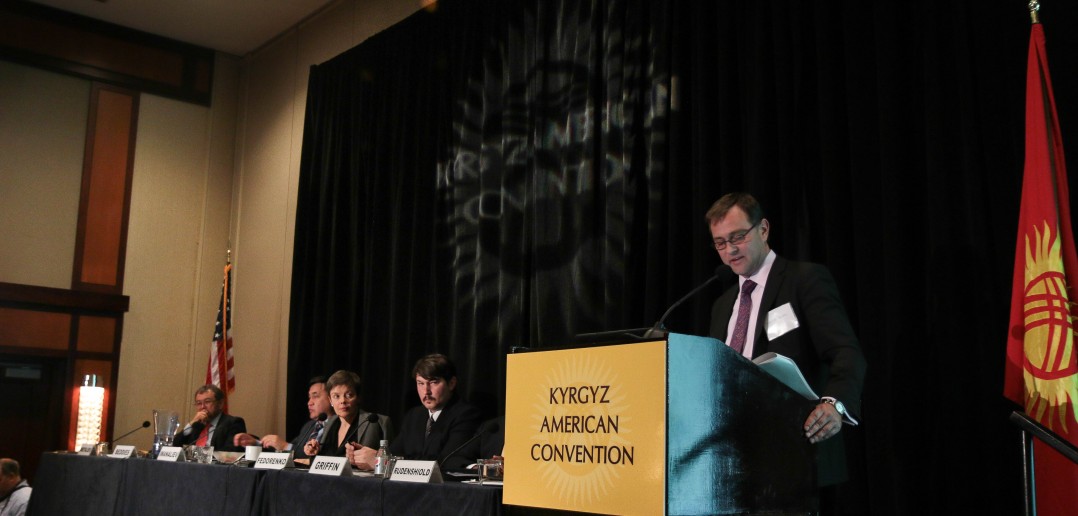The second segment of the Forum Session addressed the question, “Why Invest in Kyrgyzstan?” The moderator was Vladimir Fedorenko, a Research Fellow at the Rethink Institute.
The first panelist was the Honorable Kanybek Imanaliev, Chairman of the Committee on International Affairs, Member of the Jogorku Kenesh of the Kyrgyz Republic of the Ar-Namys party. Chairman Imanaliev first described the investment climate in Kyrgyzstan, as well as its development strategy for the period leading up to year 2017. By that year, the MP predicts an average GDP growth of 7.5% in Kyrgyzstan. Chairman Imanaliev posed a rhetorical question—why is Kyrgyzstan so attractive for investors today? Firstly, he continued, the Kyrgyz Republic has implemented systemic measures to liberalize its economy to create a favorable climate for investment and to instill anti-corruption measures. Chairman Imanaliev described corruption as the evil of Kyrgyzstan’s economy and as a major impediment to progress in Kyrgyzstan. Nonetheless, according to the Chairman, Jogorku Kenesh has taken major strides to combat this problem, such as by reducing the size of government by 20%; reducing the number of government agencies from 20,000 to 380, which is the best indicator out of all of the Central Asian countries; reducing the number of regulatory agencies from 21 to 12; halving the time frame for audits; and significantly reducing the number of required licenses and permits from 518 to 101.
The Kyrgyz government and Parliament, continued the Chairman, have also worked to implement measures of transparency and openness in the economy conducive to the confidence of foreign investments and export services, and have enacted important regulatory laws on investments, on public-private partnerships, and on mineral resources (subsoil law). For instance, regarding the implementation of important regulatory laws on investments, the Parliament has worked to guarantee equal opportunities for investment for both Kyrgyz and foreign investors alike, and has also provided investors the right to file national arbitration suits. With regards to underground resources, subsoil laws provide wide opportunities for investors to participate in the development of mineral deposits in Kyrgyzstan and to provide market mechanisms for regulating the mining industry. Additionally, beginning in 2012, the Kyrgyz Republic unilaterally introduced a visa waiver program for 44 developed countries, including the United States, which would issue 60-day-long visas.
Chairman Imanaliev was also proud to report that Kyrgyzstan has a top-20 ranking out of 189 countries according to the World Bank’s report regarding the ease of doing business, in addition to other consistently improving economic rankings. According to the 2014 report, in terms of ease of doing business, Kyrgyzstan ranks 68th compared to its previous 70th place ranking. To open a company in Kyrgyzstan, one would need to go through 2 procedures, which would last 8 days total and would cost no more that 2.6% of per capita income, landing the Republic in a leadership position at 12th place. To obtain a permit for construction, there are 12 procedures to go through that would take 142 days and would cost 127% of per capita income, placing the Kyrgyz Republic in the 66th position. For property registration there are 4 procedures that would last 6 days and cost 0.3% of the total value of the property, placing it in a leading position at 9th in the world. Kyrgyzstan’s access to credit has improved through an increasing influx of collateral, causing the requirements in credit contracts to soften to 13th place. To date, the Kyrgyz Republic has gained 6.7 points in the “protecting investors index” through changes in transparency, responsibility and accountability of CEOs and in the possibility for shareholders to file claims, ranking it 22nd in world.
Kyrgyzstan is also very rich in natural resources, including a large agricultural sector, a non-polluted environment, animal husbandry, pristine fresh water sources, mountain resorts, precious minerals, hydropower and other items such as wool, mercury, antimony, tin and gold, among others. According to Chairman Imanaliev, the most attractive sectors in the Kyrgyz Republic are agriculture, tourism, energy and hydropower, and transportations and logistics. In the agricultural sector, the Kyrgyz Republic’s strengths lie in its processing of agricultural products and machinery, and in its development of the most preferential tax regime in the region.
In the tourism sector, Kyrgyzstan offers biosphere reserves, resorts, eco-tourism, mountain tourism, mountain climbing and hunting, among others. Chairman Imanaliev mentioned that the Kyrgyz Republic is particularly interested in implementing the successful experience of Turkey in its tourism and hospitality sectors.
In the energy and hydropower sectors, the Kyrgyz Republic maintains energy potentials upwards of 160 billion cubic kilowatts per hour. Its current output, however, stalls at only 10% of its potential. The Kyrgyz Republic is also working with neighboring countries to implement the Kazakh 1000 project, which will construct modern and effective systems of transmission lines to export electricity from Kyrgyzstan to Afghanistan and Pakistan.
In terms of transportations and logistics, the Kyrgyz Republic through the support of international financial organizations seeks to rehabilitate international highways and build railways in order to open its markets to neighbors such as China. Kyrgyzstan sits in a unique, though landlocked, geographic position that offers the potential for involvement in countless international projects, such as a proposed gas pipeline from Turkmenistan to China that would pass through Kyrgyzstan.
In terms of U.S.-Kyrgyz relations, important mutual priorities include investments in the region, further bilateral cooperation, support for parliamentary democracy, eliminating administrative barriers and other obstacles to foreign investment and trade, and an FTA between the U.S. and the Kyrgyz Republic. The Chairman acknowledge the critical role the United States plays not only bilaterally, but also though its significant financial contributions to international financial institutions like the World Bank, IMF, the European Bank for Reconstruction and Development (EBRD) and others. For instance, the current portfolio of the World Bank in the Kyrgyz Republic is USD 908 million through the implementation of 51 projects; USD 342 million from the IMF; and USD 616 million through 103 projects from the EBRD.
Chairman Imanaliev closed by thanking the U.S. Congress and U.S. administration for their enormously generous contributions and support for the Kyrgyz Republic’s democratic institutions and economic reforms to build a new parliamentarian system and a stronger democracy. Chairman Imanaliev described the U.S.-Kyrgyz Convention as an opportunity to strengthen ties and mutual trust between the business communities in both countries and to find new areas and forms of cooperation and mutually beneficial agreements. He also invited the event organizers to Bishkek for the Second Annual Kyrgyz American Convention in 2014.
The second speaker was Emil Umetaliev, President of Kyrgyz Concept Company and former Minister of Economic Development of the Kyrgyz Republic. Mr. Umetaliev shared his dream that Kyrgyzstan become an accessible and top tourist destination for foreigners. Umetaliev’s Kyrgyz Concept Company is only slightly older than the Republic, and its mission is to transform Central Asia into a region of developed nations by providing diverse and accessible services in the travel and events industry. In the early stages of his company, Umetaliev introduced the country’s first English language courses with volunteer teachers from the U.S., Australia and the England. In time, the company grew to become the country’s, or even Central Asia’s, biggest player in providing event management and in providing incoming and outgoing travel services in what Umetaliev described as a “one-stop-shop.”
According to Umetaliev, the Kyrgyz Republic is in the process of moving from a traditional economy to a transitional economy. It faces many problems in this respect, but it has also already accomplished so much. For instance, the Kyrgyz Republic is a destination for women to give birth in traditional yurts; its capital, Bishkek, is a popular place to study for international students from Tajikistan, Turkmenistan, Pakistan and India; it is a regional destination for receiving medical treatment; it maintains a robust financial market for performing commercial transactions; it maintains the most advanced court of arbitration to practice financial law; it provides great venues for conducting various meetings and cultural and business forums; and it is a destination for the aging and elderly because of its clean environment and potential for green economic development. To sum up in the words of Umetaliev, the Kyrgyz Republic is an “attractive, liberal health oasis.”
Additionally, the Kyrgyz Republic has one of the fastest and friendliest visa policies in Central Asia, and it is also looking into hydropower development and an open-sky policy to liberate its air travel market and allow foreign carrier and cargo planes to use Kyrgyz air space without needing to obtain special permission from the government. Umetaliev also cited the President of Georgia for his straightforward remarks contrasting the ease of joining the Customs Unions with that of the European Union, compounded by Russia strongly pressuring its neighboring countries to join the former. Umetaliev described this as a serious cause for concern for many Kyrgyz citizens. Finally, Umetaliev urged the Kyrgyz Republic to continue to liberalize its democratic values in order to reach the highest levels of political freedom, as measured by the Freedom House, and the highest levels of economic freedom, as measured by the Heritage Foundation.
The next speaker was Christian Beddies, Deputy Division Chief and Mission Chief to the Kyrgyz Republic of the International Monetary Fund. According to Mr. Beddies, overall growth in Kyrgyzstan is still weak, with gold commodity prices falling and oil prices fluctuating. Inflation is within a comfortable range in Kyrgyzstan and growth is predicted to increase by half a percentage point from 6% to 6.5% next year, especially as key emerging markets, like Russia, continue to slow down. Mr. Beddies suggested that Kyrgyzstan enhance its resilience to financial shocks, accelerate its structural reforms, allow the exchange rate to adjust to capital flows, and become a vibrant emerging market through higher growth, less volatile tendencies, more inclusivity and more diversification. Mr. Beddies prescribed reforms that are ambitious and bold in order to overcome the following obstacles and risks: external vulnerability to shocks and lack of integration with regional and global markets; uncertain global growth, fragility and geopolitical shifts; and strong, vested domestic interests, weak institutions and accountability, in addition to potential political uncertainty. Specifically, Mr. Beddies recommended that Kyrgyzstan preserve its oil wealth for future generations and to improve its spending quality to ensure that all investments are productive ones.
Next was Antwuan Griffin, Deputy Assistant within the Secretary’s Office of U.S. Operations, Department of Commerce. The Department of Commerce, according to Mr. Griffin, is proud to have worked with Kyrgyz business people since its independence in 1991, describing the U.S. as “open for business” in Kyrgyzstan. According to Griffin, broadly speaking, investments yield significant economic growth and have a multiplier effect in attracting foreign aid and investment. Specifically, through the Special American Business Internship Training (SABIT) programs in the areas of travel and tourism, energy efficiency and construction and cargo transportation and logistics, 180 Kyrgyz business leaders and government officials have received specialized training in the U.S. According to its website, SABIT programs build partnerships and provide technical assistance to Eurasian business leaders by training them in U.S. business practices. As such, the SABIT programs directly support Eurasian economic and civil society development by encouraging market-based reforms and by generating valuable export and investment opportunities for U.S. industry.
Griffin also described U.S. cooperation through its Embassy in Bishkek, with the U.S. Chamber of Commerce, and through several conferences organized in the Kyrgyz Republic to improve trade facilitation, bring Kyrgyz companies to major U.S. trade shows, and conduct “doing business with the U.S.” trade events with U.S. companies in both Bishkek and Osh. Griffin also encouraged commercial law development programs to provide technical assistance to strengthen intellectual property rights enforcement and improve transparency in government procurement, which he described as steps critical in helping the Kyrgyz Republic to improve its competiveness in the global market. While the U.S. Department of Commerce does not maintain an office in Bishkek, its colleagues in the State Department at the U.S. Embassy work to connect Kyrgyz businesses to the Commerce Department and help them gain access to U.S. markets and services.
Lastly, Eric Rudenshiold, Senior Officer in Charge for Central Asia at USAID, discussed the future of investment cooperation between the United States and the Kyrgyz Republic, as well as the overall investment climate of Kyrgyzstan. According to Rudenshiold and USAID by extension, the Kyrgyz Republic is the most democratic country in Central Asia. The Kyrgyz Republic has demonstrated the challenges of overcoming corruption and trying to establish a stable and democratic country. Following the revolutions in 2005 and 2010, for instance, the country shifted from a top-down presidential system to a more accountable parliamentary system. Rudenshiold described this transition as facilitating the rise of party politics and real political competition in Kyrgyzstan, in addition to heightened political tension in a country not accustomed to unscripted party rivalry.
Though its political stability is certainly a strength, according to Rudenshiold, the average Kyrgyz citizen does not feel the same about the Republic’s economic stability. In fact, many view it as an elusive goal of great concern. This is due to a variety of contributing factors. To begin with, the dissolution of the USSR left the Kyrgyz Republic with few industries and an infrastructure inadequate for developing a new economy. The poverty rate in Kyrgyzstan is also quite high, with 2 million people—or 2 in 5 workers—living below the poverty line. Rudenshiold attributes this poverty to a lack of opportunity for people to earn a living wage inside the Kyrgyz Republic and therefore having to emigrate to find work. In fact, it is estimated that a third of the Kyrgyz workforce has migrated, primarily to Russia, to find employment and send remittances to families back home. These factors provide a massive challenge to a government, economy and citizenry in the throes of development. Additionally, according to USAID, there is an urgent need for a more stable and affordable food supply, as 25% of households are “food insecure,” meaning that these households spend more than 60% of their income on food.
In order to help jumpstart the economy, Rudenshiold discussed how USAID has targeted a number of different sectors to yield the greatest overall impact. For example, USAID sent USD 6 million annually to the Feed the Future program to increase food security in partnership with the Kyrgyz Republic, other donors and farmers. The goal of the program, according to Rudenshiold, is to raise food production and lower market costs and prices for the consumer, which would lead to a return of agricultural jobs to Kyrgyzstan and increased food availability for families. The program has already assisted 20,000 farmers and plans to increase seed variety to generate more productive crops. It has also helped over 80,000 farmers adopt better farming and animal care practices to render their farms more profitable and productive in terms of crop output, which then translates to more food for the population.
Furthermore, all of USAID’s programs are responsive and reactive to conditions as they evolve in the country. For instance, as many women are left behind when male members of households emigrate for work, USAID has worked to provide more support and training to female entrepreneurs. USAID also works on projects related to energy security, energy policy agendas, promoting a sustainable electronic grid for the country and the region, tourism, mining and hydro-electricity. It works to assist the Kyrgyz government in implementing new international policies that have been developed and designed to promote growth from within, and works with members of civil society, business groups, and all thee branches of the government.
The fact that the Kyrgyz Republic receives the single largest investment by USAID in Central Asia is telling. USAID recognizes the need for reform and modernization of economies at large, and it also maintains very real expectations of governmental capabilities. With regards to the Kyrgyz Republic, USAID has observed a tenacious political will supported by meaningful, concrete actions already taken by the government. Its indicators in the World Bank report for doing business have improved, and its economy continues to make modest but steady improvements. To close, Rudenshiold discussed that given the size of the challenges facing the Kyrgyz Republic, and the fact that its accomplishments were achieved in a very short period of time, obstacles to further development are significant in the Kyrgyz Republic but with a helping hand they are not insurmountable.
Following Rudenshiold’s presentation, the Honorable Congresswoman from Illinois, Tammy Duckworth, shared a few brief remarks. Rep. Duckworth encouraged the Kyrgyz Republic to continue its work to ensure that the U.S. and the Kyrgyz Republic move forward together in cooperation. A former helicopter pilot in the military, Rep. Duckworth shared her story of being injured in Iraq when she was hit by a rocket-propelled grenade and lost both of her legs. As a result of these experiences, Rep. Duckworth recognizes a warrior culture when she sees one. Rep. Duckworth was confident that this warrior culture and history will prepare the Kyrgyz Republic to face and overcome its challenges in the future.
Following Rep. Duckworth’s remarks, Brian Sant Angelo, a senior business development officer with the Export-Import Bank of the U.S., addressed the audience. The Ex-Im Bank is the official export crediting agency of the U.S. government and supports financing for exports around the world in over 100 different countries and with exposure of over USD 100 billion. Sant Angelo discussed how purchasing from the U.S. often provides more attractive financing solutions than those available in local markets by taking private sector funds and wrapping it in the guarantee of the U.S. government. Oftentimes, this extends tender and lowers interest rates. Sant Angelo concluded by offering to discuss any potential projects following his remarks.
And lastly, John Didiuk, Senior Investment Officer at the Overseas Private Investment Corporation (OPIC), offered brief remarks. OPIC oversees private corporate financing and is the development finance institution of the U.S. government. According to Didiuk, OPIC’s mission is to mobilize U.S. investments and U.S. capital into developing and emerging markets. OPIC is open in the Kyrgyz Republic and in more than 100 other countries and has an investment portfolio of over USD 16 billion. Didiuk also invited anyone who wanted to speak with him about possible projects to find him after he concluded his remarks.




